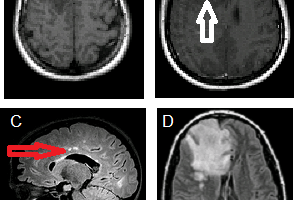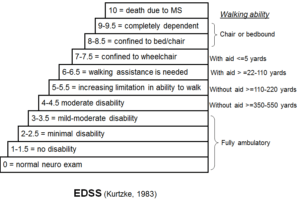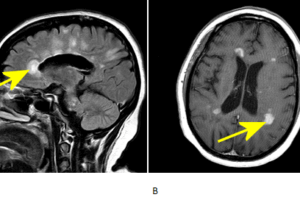
Tumefactive multiple sclerosis (MS) is an unusual but important manifestation of multiple sclerosis. Read more »
Dr. Rui Guan interviews Dr. Anthony Reder, an MS specialist at the University of Chicago. This article, geared to residents and fellows, gives insight into Dr. Reder’s world. Read more »
Multiple Sclerosis expert Dr. Anthony Reder from the University of Chicago Department of neurology is interviewed by Dr. Rui Guan on topics in MS of interest to neurologists and general practitioners alike. Read more »

Disability progression is assessed by the Expanded Disability Status Score (EDSS). To make sense of the scale from 0 (normal neuro exam) to 10 (death due to MS), a few pointers: Read more »
Uhthoff’s phenomenon describes the worsening of multiple sclerosis symptoms with overheating, e.g. exercise, hot weather, or saunas, which cause conduction delay or block in a demyelinated nerves. In practice, even a change... Read more »

“Multiple sclerosis (MS) does not really remit” was the opening theme of this weekend’s conference. Lead by three MS-experts, Drs. Omar Khan, Guy Buckle, and Stephen Krieger, a roomful of neurology residents... Read more »
Optic neuritis is inflammation of the optic nerve. It is principally due to demyelinization and is closely associated with multiple sclerosis (MS). Read more »

MULTIPLE SCLEROSIS is aptly named for the scleroses (scars or plaques) that occur as the disease resurfaces in multiple episodes. Read more »

Multiple sclerosis is the most common demyelinaing disease and the most common disabling CNS disease of young adults. The etiology is not certain but likely autoimmune. The disease is characterized by the... Read more »
